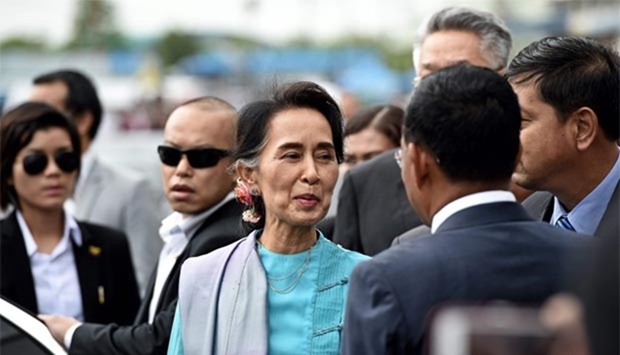Thai police struggled to hold back a boisterous thousands-strong crowd of migrant workers, many holding aloft framed photos of the nation's star politician while chanting "Mother Suu, Mother Suu".
Although cocooned by security guards, crowds craned to grab a fleeting glimpse of a politician who strides over Myanmar's democracy movement and exerts a powerful moral force among her countrymen wherever they are.
"I am so happy, I love Aung San Suu Kyi... today is the first time I have seen her," said 32-year-old Banyar Taik, who works at a tuna processing plant.
It is Suu Kyi's highest profile overseas visit since her pro-democracy party took power in April, ending nearly half a century of military domination.
Her government has seeded hopes for a new era of prosperity that could eventually convince the army of low-paid Myanmar labourers in Thailand to return home.
The two Southeast Asian neighbours have travelled in starkly different directions in recent years.
While Myanmar's junta has rolled back its chokehold on politics, Thailand remains in the grip of a military that seized power in 2014.
Seeking to escape poverty at home, some one million registered Myanmar migrant workers form the backbone of Thailand's manual workforce.
Tens of thousands of others work illegally, with some estimates putting the total number of Myanmar nationals in Thailand at three million.
Rights groups say migrants -- legal and otherwise -- are vulnerable to unscrupulous officials, trafficking gangs and employment agencies who charge huge sums to get them poorly paid work.
Their low status also sees them treated with scorn and mistrust by many Thais.
Suu Kyi, who is Myanmar's de facto leader despite being barred from the presidency, vowed to support migrants in discussions during her three-day trip.
"I want to hear the voices from our nationals. Please speak openly about we can do for you and what you expect," she said.
But she did not field questions from reporters in keeping with the tight control she has exerted over political messaging since her party took power in April.
The Lady carries hope
Suu Kyi enjoys a peerless status to many Myanmar people who see her as symbol of defiance through the dark junta years and a beacon of hope.
Her visit "fills me with hope," Myanmar migrant Thon Barami, 50, told AFP at the scruffy port, which is a hub for Thailand's huge seafood industry and home to more than 100,000 low-paid Myanmar labourers.
"We have problems here in Thailand. She might help us with labour rights... people all around the world will listen to her," she added.
The fishing sector has been battered by revelations of the use of slave labour and the widespread exploitation of workers.
The scandals have prompted threats of sanctions by the European Union -- a key market for the multi-billion-dollar Thai seafood industry.
"They all want to go home, but they are just waiting for the economic situation (in Myanmar) to improve significantly," explained Andy Hall, a migrant rights activist who has an office in the port town.
The nemesis of Myanmar's generals throughout a quarter-century of struggle for democracy, the Nobel laureate will meet with the leader of the Thai junta in Bangkok on Friday.
The 71-year-old is officially Myanmar's foreign minister and state counsellor.
It is unclear if she will make a scheduled trip to a refugee camp in Ratchaburi province on Saturday.
It is one of nearly a dozen camps in Thailand holding more than 100,000 refugees who have fled conflict in Myanmar.
Many are ethnic Karen displaced by war with Myanmar's army. The violence abated following a 2012 ceasefire, but conflict with other ethnic rebel groups continues.
Thailand, which does not accept refugees, wants to repatriate camp residents -- some of whom have been born on Thai soil but are barred from citizenship.
Suu Kyi is also not scheduled to visit any of the Thai centres holding hundreds of Rohingya boat migrants, a Muslim group who have fled poverty and persecution in western Myanmar.

